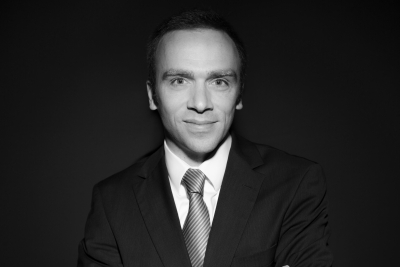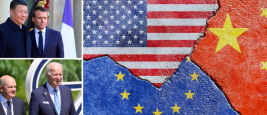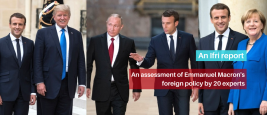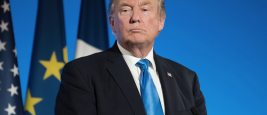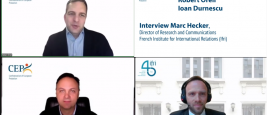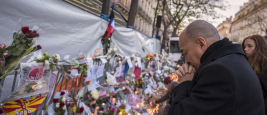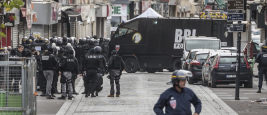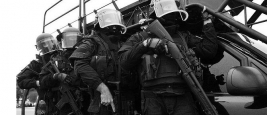
Marc HECKER
Deputy Director of Ifri, Editor-in-Chief of Politique étrangère, and research fellow at the Security Studies Center
Research Interests:
- Terrorism
- Internet and radicalization
- Communication and conflict
- Repercussions of the Israeli-Palestinian conflict in France
Marc Hecker is Deputy Director of Ifri, Editor-in-Chief of Politique étrangère, and a research fellow at the Security Studies Center. He holds a PhD in political science from University Paris 1 Panthéon-Sorbonne. He graduated from the Institut d’Etudes Politiques of Strasbourg and holds a Masters (DEA) in International Relations from University Paris 1 Panthéon - Sorbonne. He taught a course on "terrorism and asymmetric warfare" at Sciences Po for several years. He also spent one academic year at Trinity College, Dublin.
Marc Hecker has published several books: La presse française et la première guerre du Golfe (L'Harmattan, 2003), La défense des intérêts de l'Etat d'Israël en France (L'Harmattan, 2005), War 2.0: Irregular Warfare in the Information Age (Praeger, 2009 with Thomas Rid), Intifada française? (Ellipses, 2012) and La Guerre de vingt ans. Djihadisme et contre-terrorisme au XXIe siècle (Robert Laffont, 2021 with Elie Tenenbaum). His articles are published in major journals (Policy Review, Internationale Politik, Commentaire, Etudes, etc.) and newspapers (Le Monde, Le Figaro, Les Echos, Libération, etc.).
How are women jihadists prosecuted and sentenced in different European countries? What happens when they are incarcerated? What reintegration programs are in place for women formerly detained for terrorism-related offenses?
As French President Emmanuel Macron (accompanied by Ursula von der Leyen) is on a state visit to China, some twenty Ifri researchers decipher the stakes of the U.S./China/Europe strategic triangle.
La Guerre de vingt ans was awarded the Prize for the best book on geopolitics in 2021.
France has traditionally taken a security-based approach to the fight against terror. It was a latecomer to the field of radicalization prevention and the establishment of disengagement programs aimed at jihadists. It only started to think seriously about the issue in 2013 and its first...
From May 23 to 29, over 300 million Europeans are set to elect a new Parliament for a five-year term.
Despite a relative weakening since 2017, the international jihadist movement should continue to pose a genuine threat over the next decade.
How can we define Emmanuel Macron’s foreign policy since he took office? After Nicolas Sarkozy’s brazen style of “gutsy diplomacy” and François Hollande’s “normal diplomacy”, the eighth president of the Fifth Republic seems to have opted for an agile classicism. In substance, he makes no claim...
This study, based on original judicial sources, assesses the profiles of 137 individuals sentenced in France for cases related to jihadism.
In the week following Trump’s election, Ifri published a study to identify the likely changes in U.S. foreign policy. From the outset, this election appeared as a change in the U.S.’ trajectory, with consequences on the power relations and functioning of the international system.
France’s current presidential campaign has created an unprecedented situation fuelled by revelations and a total absence of restraint, but it has not truly taken account of the disruptions of the last year: Brexit, the attempted coup in Turkey, the election of Donald Trump, the recapturing of...
In a polarized France, President Emmanuel Macron must navigate the conflict in a way that doesn’t further inflame the public or advantage his political rivals.
An interview with Marc Hecker, Ifri's Director of Research and Communications.
"Still now I have the images of the corpses next to my feet": Olivier Laplaud and his wife were in the Bataclan enjoying themselves amongst a crowd of 1,500 people when everything changed in an instant.
France has repatriated more than half the people it defined as radical Islamists living in the country without a residence permit since 2018. Now it wants to extend the penalty and deport even more.
On July 16, Djamel Beghal is expected to be released from the Rennes-Vezin prison in the west of France. Beghal is a well-known figure in the European jihadist sphere. Born in Algeria in 1965, he settled in France in 1987. Ten years later, he moved to the United Kingdom with his French...
The report on the country's intelligence and security services follows last year's terrorist attacks. It says that each of of the terrorists was known to French authorities before the killings began.
PARIS — Crowds gathered on Monday to place flowers and candles and pay their respects to the 89 people killed at the Bataclan, as speculation swirled about why the legendary music hall was the target of the most brutal of the terrorist attacks on Friday.
...One week after the terrorist attacks in Paris, the police killed two jihadists in Belgium. Officials said that the two men were coming back from Syria and were on the brink of targeting Brussels. The capital of Belgium was already targeted a few months ago: in May 2014,...
For the past two years, French experts on terrorism have felt anxious. They often emphasized: “The question is not whether France will be targeted by a terrorist attack, but when.” The dreaded attack took place on January 7th, 2015. That evening, various speakers across the...



